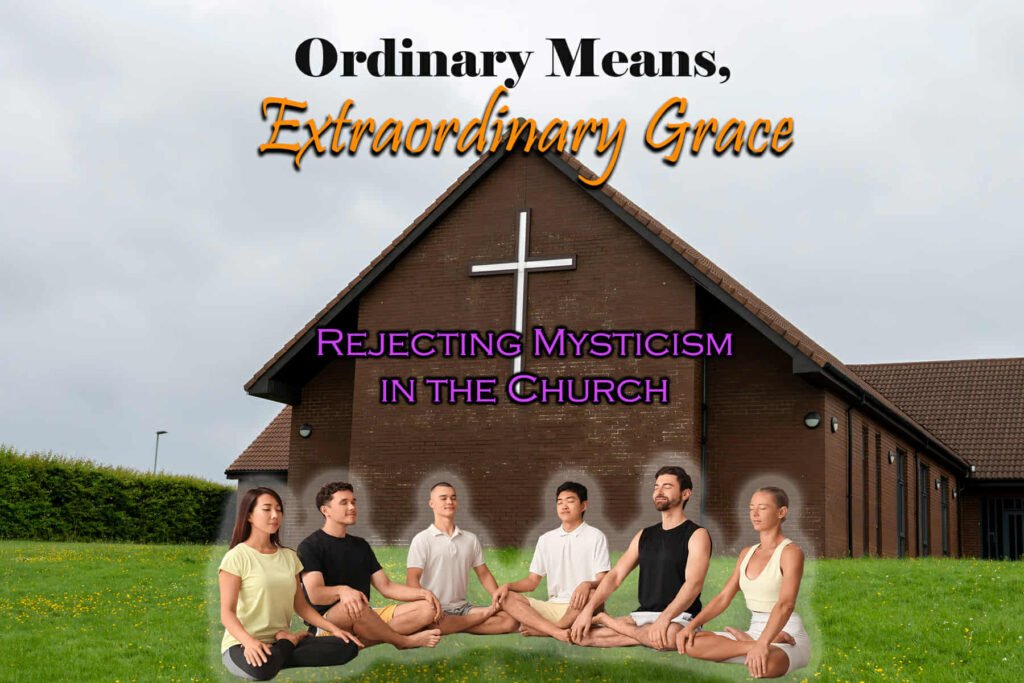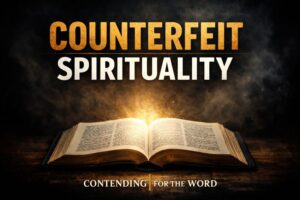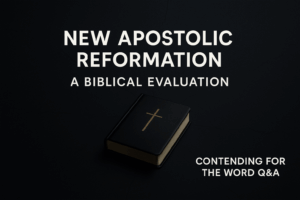⏱️ Estimated Reading Time: 6 min read
Holding Fast to the Word: A Biblical Response to Mystical Spirituality
By Dave Jenkins
Fall 2025 | Theology for Life
From the earliest centuries of the Church, Christians have wrestled with competing voices that promise more than the gospel. Mystical spirituality, whether in ancient monasticism, medieval mysticism, or modern contemplative movements, presents itself as a pathway to a deeper, richer experience of God. It often emphasizes silence, visions, spiritual sensations, or secret wisdom. In this age, it comes in many forms: contemplative prayer modeled after non-Christian meditation, “thin places” spirituality, or claims of new revelation beyond the Bible. But these questions must be asked: “Is Christ sufficient? Is His Word enough?”
The apostle Paul, writing to the Colossians, confronted believers tempted by visions, ascetic practices, and angelic worship. Likewise, he warned Timothy about false teachers who maintained “a form of godliness” but denied its power (2 Timothy 3:5). These passages remind us that mystical substitutes for the gospel are neither new nor harmless. They diminish Christ’s sufficiency and lead God’s people away from the only sure foundation—His Word.
This article will examine Paul’s warnings in Colossians 2 and 2 Timothy 3, showing how they equip the Church to resist mystical spirituality and hold fast to the Word of God.
Exegesis of Colossians 2: Christ Alone is Sufficient
Warning Against Captivity
“See to it that no one takes you captive by philosophy and empty deceit, according to human tradition, according to the elemental spirits of the world, and not according to Christ” (Colossians 2:8).
Paul depicts false teaching as a kidnapper taking believers hostage through “empty deceit”. The “elemental spirits” may refer to primitive spiritual forces or demonic influences masquerading as wisdom. For our day, mystical practices that rely on secret techniques, spiritual intermediaries, or non-biblical rituals function in the same way. They draw attention away from the sufficiency of Christ and toward human tradition.
Completeness in Christ
“For in him the whole fullness of deity dwells bodily, and you have been filled in him, who is the head of all rule and authority” (Colossians 2:9–10).
The antidote to mystical deception is the sufficiency of Christ. He is not partly God; He is fully God. Believers are not lacking spiritual resources; they are complete in Him. Mysticism whispers, “You need more—more visions, more experiences, more secrets.” Paul answers, “You already have everything in Christ.”
Shadows vs. Substance
“Therefore let no one pass judgment on you in questions of food and drink, or with regard to a festival or a new moon or a Sabbath. These are a shadow of the things to come, but the substance belongs to Christ” (Colossians 2:16–17).
Mystical or legalistic systems often elevate rituals above reality. Whether through diets, calendars, or ascetic practices, they substitute shadows for substance. Christ is the reality; the rest are signposts. When Christians elevate practices above the person of Christ, they risk turning temporary aids into ultimate ends.
False Humility and Visions
“Let no one disqualify you, insisting on asceticism and worship of angels, going on in detail about visions, puffed up without reason by his sensuous mind, and not holding fast to the Head” (Colossians 2:18–19).
Here Paul directly addresses mystical spirituality. Claims of visions, encounters with angels, or spiritual elitism are not signs of maturity but of pride. Mysticism often creates a two-tier Christianity: the “ordinary” and the “elite.” Paul says all believers are joined to Christ, the Head, and receive nourishment from Him.
Worthless Asceticism
“These have indeed an appearance of wisdom in promoting self-made religion and asceticism and severity to the body, but they are of no value in stopping the indulgence of the flesh” (Colossians 2:20–23).
Mystical spirituality promises power but delivers weakness. Severe disciplines and mystical techniques may look wise, but they cannot transform the heart. Only the gospel can do that.
Exegesis of 2 Timothy 3: The Sufficiency of Scripture
Perilous Times and False Teachers
“But understand this, that in the last days there will come times of difficulty… having the appearance of godliness, but denying its power. Avoid such people” (2 Timothy 3:1–5).
Paul warns against those within the Church who mimic spirituality without substance. Mystical spirituality fits this warning—it may cloak itself in Christian language, but if it sidelines the gospel or the Word of God, it denies true godliness.
Continuing in the Word
“But as for you, continue in what you have learned and have firmly believed…” (2 Timothy 3:14–15).
Paul exhorts Timothy to stay rooted in Scripture. Mystical spirituality says, “Go beyond the Word to find deeper wisdom.” Paul says, “Stay in the Word—it brings you to Christ and equips you for salvation.”
The Inspiration and Sufficiency of Scripture
“All Scripture is breathed out by God and profitable… that the man of God may be complete, equipped for every good work” (2 Timothy 3:16–17).
If Scripture equips believers completely, then no mystical experience is necessary to draw near to God. The sufficiency of Scripture is both doctrinal truth and pastoral comfort—it assures us that God has given everything needed for life and godliness.
Holding Fast to the Word in an Age of Mysticism
Both passages address the same danger: substituting mystical experience for the sufficiency of Christ and His Word. Paul’s answer is simple and timeless: hold fast to Christ and the Word.
Why Mystical Spirituality Appeals Today
- Experience over doctrine
- Elitism over equality
- Ambiguity over clarity
- Escape over endurance
Biblical Means of Grace vs. Mystical Substitutes
- The Word of God — preached, read, studied, meditated upon.
- The Sacraments/Ordinances — baptism and the Lord’s Supper.
- Prayer — shaped by Scripture and empowered by the Spirit.
- Fellowship — the gathered body building one another up.
Answering Common Objections
Objection 1: “But don’t contemplative practices make me feel closer to God?”
Feelings are real, but not final. Scripture, not sensation, determines intimacy with God.
Objection 2: “Isn’t meditation biblical?”
Yes, but biblical meditation fills the mind with the Word, not empties it.
Objection 3: “Isn’t mystical spirituality part of Church history?”
History is not the standard; Scripture is.
Pastoral Implications for Today’s Church
- Teach sufficiency with clarity.
- Shepherd the spiritually hungry.
- Guard against spiritual elitism.
- Model ordinary faithfulness.
The Call to Hold Fast
In every age, the Church faces movements that promise more than Christ. But Paul’s words still ring true: “You have been filled in Him” (Colossians 2:10). “All Scripture is breathed out by God…” (2 Timothy 3:16–17).
Conclusion: Why the Word is Enough
Mystical spirituality may promise deeper intimacy or higher experience, but it distracts from Christ and diminishes Scripture. God has given His people the means of grace—the Word, prayer, sacraments, and fellowship—through which He nourishes and sustains them. Christ is enough, His Word is enough, His grace is enough. So, dear Christian, hold fast to the Word. In Christ, you are complete. In Scripture, you are equipped. And by the Spirit, you are secure—now and forever.
This article appears in the Fall 2025 Issue of Theology for Life Magazine, exploring “The Means of Grace.”




